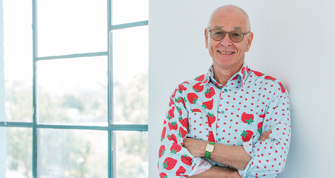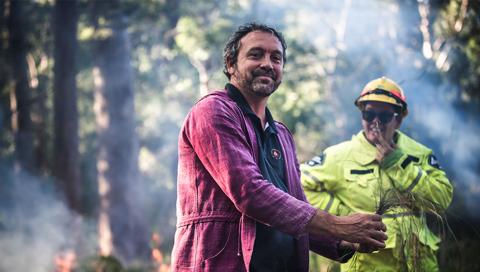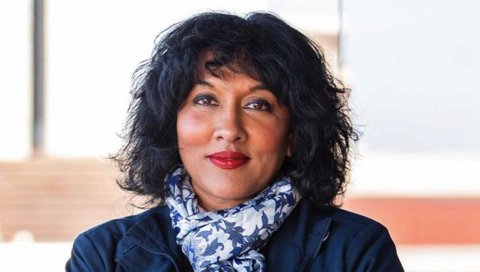“This is the decade in which, contrary to everything humanity has experienced before, we have everything in our power. We have the capital, the technology, the policies. And we have the scientific knowledge to understand that we have to half our emissions by 2030.”
Explore upcoming events

Upon launching the Sydney Writers’ Festival, Artistic Director Michael Williams said, “Solutions to the problems we’re currently facing – the climate emergency, the global refugee crisis, racism, the failures of public discourse, the death of political accountability – sometimes feel out of reach, so we’ve gathered thinkers, writers and experts we trust to show us the way.” Read on to discover some of these wayfinders of the Festival – from scientists to Indigenous fire practitioners, infection management experts to misinformation analysts.
Karl Kruszelnicki
It’s not easy teaching science to an entire country, but Karl Kruszelnicki does it with ease. Physicist, biomedical engineer, physician, scientist, author and belly button lint researcher, Australia’s favourite nerdy father Dr Karl is an expert on … pretty much everything. A Member of the Order of Australia and Ig Nobel prize recipient, Dr Karl has been answering Australians’ weird and wild science questions with affectionate earnestness and enthusiastic precision for decades. Most recently, he’s written Dr Karl’s Little Book of Climate Change Science and Dr Karl’s Surfing Safari Through Science. Collect all your quirkiest queries and catch Dr Karl in the Festival’s own 'Science Class' with fellow expert science communicators Raina MacIntyre and Alice Motion with ABC’s Olivia Willis.
Ariel Bogle
Ariel Bogle is an award-winning tech reporter and analyst with the Australian Strategic Policy Institute’s International Cyber Policy Centre – essentially, an expert misinformation sleuth. Ariel researches online influence and disinformation campaigns and is a specialist in health misinformation and surveillance. From the China Cables to the Australian Federal Police’s use of facial recognition technology and COVID conspiracies, Ariel has reported on some of the most critical and curious issues of our times. See her wrestle facts from fake news at the Festival event ‘Who’s Afraid of Big Tech?’ alongside a panel of tech experts comprising Angharad Yeo, Chris Cooper and Paul Smith speaking with Rae Johnston.
Christiana Figueres
The public face of the most pivotal climate agreement in history – the Paris Climate Agreement of 2015 – Christiana Figueres is an internationally recognised leader on global climate change, credited with creating a new kind of collaborative diplomacy. She was the executive secretary of the United Nations Framework Convention on Climate Change (2010–2016), co-founded Global Optimism – an organisation focused on creating environmental and social change – and is the co-author of the acclaimed The Future We Choose: Surviving the Climate Crisis. If anyone knows how to avoid the impending climate catastrophe, it’s Christiana. Learn about our best hopes for change with Christiana and fellow respected voices in the climate crisis Will Steffen and Prasad Menon, speaking with Tim Flannery at ‘The Climate Cure’.
Victor Steffensen
Victor Steffensen is a Tagalaka descendant from Far North Queensland who for decades has been applying Indigenous knowledge to land management across Australia. From advocating for cultural burning practices led by Aboriginal people to leading workshops on fire management for farmers, firefighters and government agencies, Victor is a prominent voice in Australia’s environmental wellbeing and bushfire management. His nuanced understanding of Country – informed by traditional teachings passed on for thousands of years and his mentors Kuku Thaypan Elders Dr Tommy George and Dr George Musgrave – have seen him support many communities across Australia to heal their land. Discover how we may prevent further catastrophic bushfires with Victor as he joins writers and thinkers Richard Beasley, Bruce Pascoe and Rebecca Giggs at ‘Land of Plenty’, a panel discussion with ABC Radio’s Philip Clark.
“Our work has occurred during a time of considerable change in the attitudes of the broader community towards Aboriginal knowledge. Since the 2019 wildfires, there’s been a huge shift and that is what we are all about, Aboriginal voices and Aboriginal knowledge being heard. Fire is just the beginning...The healing of communities is crucial, the healing of Country is crucial and decolonising the minds of Black and white Australians is crucial to us finding solutions into the future.”
Adama Kamara
Deputy CEO of the Refugee Council of Australia Adama Kamara has been working in refugee services for 15 years and is a passionate advocate for those seeking asylum. Born in Sierra Leone, Adama and her family happened to be in Australia when the Sierra Leone civil war began, and became tireless supporters of those displaced by the war, helping many to settle in Australia. Adama leads the ward-winning ‘Refugee Camp in my Neighbourhood’ project, a simulated refugee camp in Western Sydney that generates empathy and insight into the experience of refugees and celebrates their contributions in the community. Adama lends her personal and professional expertise at ‘Displaced’, a discussion on the human consequences of global instability also featuring Behrouz Boochani, Zoe Holman and Zaki Haidari, with Ben Doherty.
Raina MacIntyre
With theories currently abounding on vaccines, disease and infection, get an authoritative account of all things pandemic-related from Professor Raina MacIntyre. Head of the Biosecurity Program at the Kirby Institute, UNSW, Raina leads a research program in the control and prevention of infectious diseases, including vaccinology, pandemics and emerging infections – and has been studying face masks long before COVID. Raina has called for authorities to consider how open-source data could be used to proactively manage future outbreaks. With 400 peer-reviewed publications, the Sir Henry Wellcome Medal and Prize, the Public Health Association of Australia’s National Immunisation Award, and the Frank Fenner Award for Research in Infectious Diseases – this is an expert you can rely on. Hear from Raina and fellow authorities in science at ‘Science Class’.
“There’s a huge amount of open-source data out there – social media, news reports – that is uncurated but vast, and it can be tapped to monitor for pandemic signals. Law enforcement already do this to monitor for signs of terror attacks, but you can do the same thing for outbreaks.”

